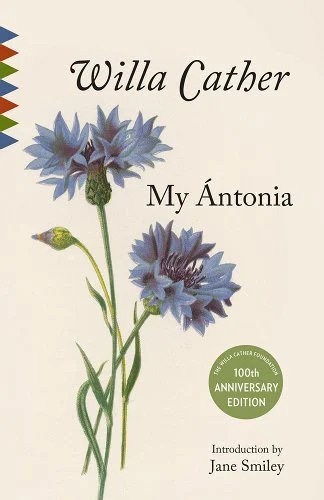
One thing I love about Substack is that it feels like a giant freewheeling experiment. I started posting weekly essays on Tuesdays almost exactly two years ago. After studying other writers I admired on the platform, I added a weekly Friday post and have followed that schedule ever since.
Tuesday is the main course: essays, interviews, and craft resources. Friday is more of a side: discussions, shorter sketches, and poems.
Starting in April, I’d like to add another wrinkle to my Friday stream, inspired in part by
and , who both have introduced me to the “read-along.” As I understand it, read-alongs live somewhere between book clubs and online courses. The goal is to learn something substantive without leaning too hard into work. To reclaim learning as fun.Perhaps no author is better suited to this approach than Willa Cather. You can dive as deeply as you like into Cather’s texts, but you don’t need to be a scholar to appreciate them. American soldiers carried pocket editions of O Pioneers!, My Ántonia, and Death Comes for the Archbishop into WWII. For many young men, these were not intimidating works of art: they were reminders of home.
In fact, discovering Willa Cather as a college sophomore was a homecoming for me. My Ántonia revealed possibilities in my Czech history that I’d never imagined and opened a future where I could claim storytelling and research as my life’s work. You might say that I’m still following the path that Cather opened to me, and I’m eager to share a portion of it with you.
Beginning on Friday, April 5, I invite you to join me for a read-along of My Ántonia. I’ll share a more detailed reading schedule before then, but we’ll follow the slow reading model with no more than a few chapters per week.
You can read along in the First Edition, available for free at the excellent Willa Cather Archive.
The Vintage edition is an affordable option in paperback.
Or you can pay a little more for the Scholarly Edition, which includes a historical essay and many explanatory notes. The Scholarly edition is also free in digital form.
The plan is as follows — adapted, with thanks, from
:Every Friday from April 5 through the end of the book I’ll post a brief essay on that portion of the reading. I’ll add a few prompts to spark discussion, as well as excerpts from scholarly essays and other resources as appropriate.
The Friday read-along will be free to all with the goal of gauging interest in a more ambitious project: reading all 12 of Willa Cather’s novels in a year. (Fun fact: Did you know that Cather’s first novel, Alexander’s Bridge, which she styled as a failure, was a major influence on F. Scott Fitzgerald’s The Great Gatsby?)
A slow read of My Ántonia will take 10-12 weeks, so I might add a few supplemental posts for paying subscribers on Tuesdays, such as a chapter from my memoir, adaptations of my scholarship on Cather, perhaps even interviews with Cather scholars.
My Ántonia is, unequivocally, one of the Great American Novels. No one captures the pioneer myth like Cather does, and I never tire of her ability to transform the everyday into enduring art. But this book is also a touchstone for the contradictions at the heart of American identity, such as the juxtaposition of the immigrant dream with echoes of slavery. And I find that my sympathy for the narrator, James Burden, has evolved significantly over time. There is something here for everyone, and if you’ve never discovered Willa Cather, this could be your chance. But fair warning: once you acquire a taste for Cather’s prose, you may just find yourself in deep.
For now, I’d love to hear a little about your level of familiarity with Cather.
If you know her work well, which books have you read?
If you don’t know her work, what is your impression of it and of her as an American author?
What might you hope to get out of reading this classic book alongside others in The Recovering Academic community?
Finally, if you are one of the Catherites among my readers, what reasons might you give for others to discover this remarkable American artist?
I’ll start with my own. In the words of my PhD mentor, Susan J. Rosowski, from her historical essay on A Lost Lady:
“When in 1990 the Encyclopaedia Britannica for the first time included the works of women writers in its list of Great Books of the Western World, Willa Cather was among the four named, and the only American woman.”






Josh, I'm so excited about this idea! I could never read My Antonia enough times. Also, looking at the 61.1 volume (2018) of The Willa Cather Review is such a great way to have more resources as we're reading. I can't wait to see your prompts! (https://www.willacather.org/discover/educational-resources/readers/willa-cather-review)
Josh - you know I am a fan. I already read three Cather books this year - My Antonia, Death Comes for the Archbishop, and A Lost Lady. Previously I had read O Pioneers which is the book that made me fall in love with her writing. I don't think I will reread these since I read them so recently but I will definitely following along for the discussions.
The thing I love about Cather is how approachable her writing is. You don't need to be a scholar to decipher the text. Her works, while containing significant depth, read like novels, which they are. The characters are easy to identify with because they are normal people. She creates something extraordinary from the mundane.
If any of your readers are interested in my thoughts on her they can refer to my recent article: https://open.substack.com/pub/matthewmlong/p/my-willa?r=2x99tr&utm_campaign=post&utm_medium=web&showWelcomeOnShare=true
Looking forward to this. Thanks.